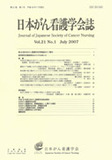Japanese
English
- 販売していません
- Abstract 文献概要
- 参考文献 Reference
要旨
前立腺がんは,PSA(prostate specific antigen:前立腺特異抗原)スクリーニングによる早期発見が進められている一方,早期で悪性度が低い場合,無治療経過観察(watchful waiting:待機療法)という選択肢がある.本研究の目的は,無治療経過観察中の前立腺がんをもって生きる人々の体験を明らかにし,看護支援のあり方について示唆を得ることである.
13名の対象者に,半構成的面接法を用いてその人にとっての無治療の前立腺がんとともに生きる意味についてデータ収集した.分析は,Colaizziの現象学的分析方法を参考に質的帰納的に行った.
分析の結果,無治療の前立腺がんとともに生きることの本質的要素として,「診断の受けとめ」「現時点での治療選択に対する認識」「将来の不確かさとPSA値に翻弄される思い」「自分なりに病気に取り組む姿勢」「主治医への信頼と思い」「周囲を取り巻く人々への思い」の6つが導き出された.これらの本質的要素の関連性を図式化し,「無治療の前立腺がんとともに生きる人々の体験の構造図」とした.
それぞれの本質的要素についての個人の認識を知ることで,個別性に基づいた支援の方向性がみえてくる.周囲に対し沈黙する男性たちを見守り,必要なときに必要な人からの支援を得られるよう調整する看護のあり方を考えることの重要性が示唆された.
Abstract
Prostate cancer is detected earlier with the spread of prostate specific antigen(PSA) screening test. Some of the patients with early stage localized prostate cancer choose regular checks of PSA : watchful waiting, instead of active treatment. The purpose of this study is to investigate men's experience living with untreated prostate cancer and to suggest nursing care.
13 men were interviewed using a semi-structured interview about their own meanings of living with untreated prostate cancer. The data were analyzed qualitatively referring to phenomenological approach inspired by Colaizzi.
As a result, we identified 6 essentials of experience living with untreated prostate cancer -"View of the diagnosis", "Understanding the choice of treatment at present" "Uncertainty of the future and feelings tossed by PSA", "Attitude coping with the disease for himself", "Trust and feelings regarding his physician", and "Feelings toward people surrounding him". Then, we created the "Figure of men's experience living with untreated prostate cancer" based on these 6 essentials.
We can see the direction to provide care suitable for each man, when we know how he understands these 6 essentials. We need to know how they understand the diagnosis told by their physicians, what disturbs them, and how they cope with the uncertainty. Then we can provide the information to increase the understanding of each man. We need to adjust the relationships between the men and the physicians, and the men and people surrounding them if they feel lonely because of their relationships or the gaps in understanding. Of course, we need to understand their solitude and anxiety. Nurses need to watch over reticent men and adjust the resources they need. Then nurses could become one of their resources.
Copyright © 2007, Japanese Society of Cancer Nursing All rights reserved.


